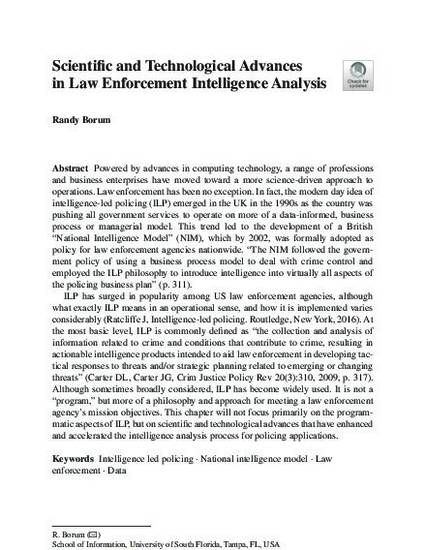
Contribution to Book
Scientific and Technological Advances in Law Enforcement Intelligence Analysis
Science Informed Policing
(2020)
Abstract
Powered by advances in computing technology, a range of professions and business enterprises have moved toward a more science-driven approach to operations. Law enforcement has been no exception. In fact, the modern day idea of intelligence-led policing (ILP) emerged in the UK in the 1990s as the country was pushing all government services to operate on more of a data-informed, business process or managerial model. This trend led to the development of a British “National Intelligence Model” (NIM), which by 2002, was formally adopted as policy for law enforcement agencies nationwide. “The NIM followed the government policy of using a business process model to deal with crime control and employed the ILP philosophy to introduce intelligence into virtually all aspects of the policing business plan” (p. 311).
ILP has surged in popularity among US law enforcement agencies, although what exactly ILP means in an operational sense, and how it is implemented varies considerably (Ratcliffe J, Intelligence-led policing. Routledge, New York, 2016). At the most basic level, ILP is commonly defined as “the collection and analysis of information related to crime and conditions that contribute to crime, resulting in actionable intelligence products intended to aid law enforcement in developing tactical responses to threats and/or strategic planning related to emerging or changing threats” (Carter DL, Carter JG, Crim Justice Policy Rev 20(3):310, 2009, p. 317). Although sometimes broadly considered, ILP has become widely used. It is not a “program,” but more of a philosophy and approach for meeting a law enforcement agency’s mission objectives. This chapter will not focus primarily on the programmatic aspects of ILP, but on scientific and technological advances that have enhanced and accelerated the intelligence analysis process for policing applications.
Keywords
- Intelligence led policing,
- National intelligence model,
- Law enforcement intelligence,
- Intelligence analysis
Disciplines
Publication Date
Winter 2020
Editor
Bryanna Fox, Joan Reid, Anthony Masys
Publisher
Springer Nature
ISBN
978-3-030-41286-9
DOI
https://doi.org/10.1007/978-3-030-41287-6
Citation Information
Randy Borum. "Scientific and Technological Advances in Law Enforcement Intelligence Analysis" Cham, SwitzerlandScience Informed Policing (2020) p. 99 - 121 Available at: http://works.bepress.com/randy_borum/75/
